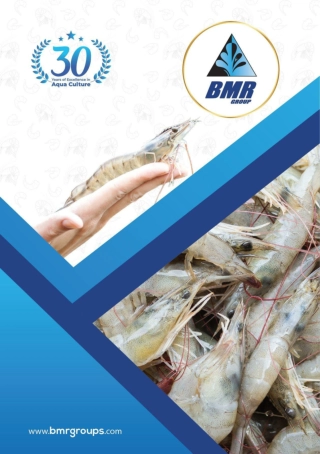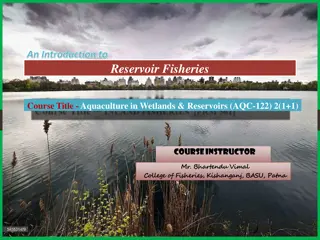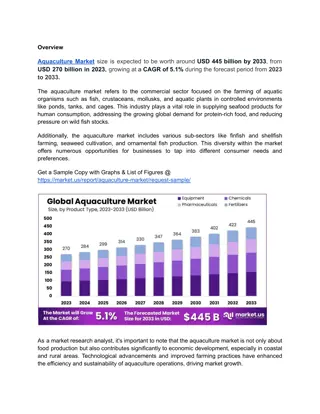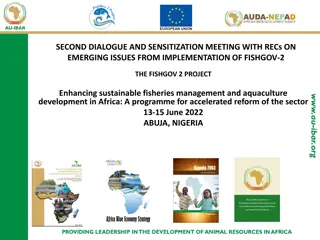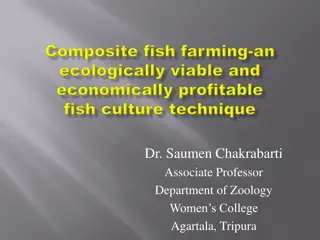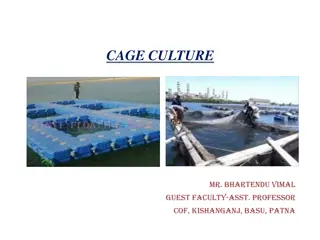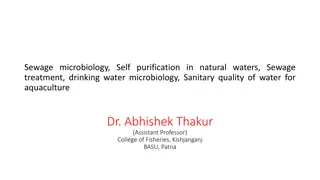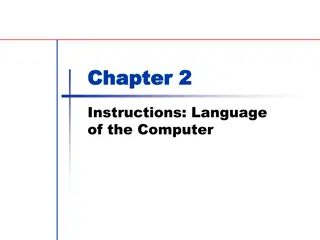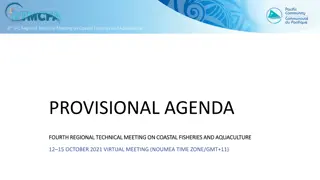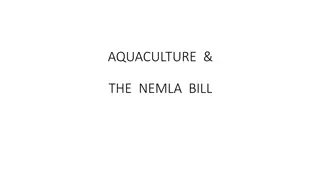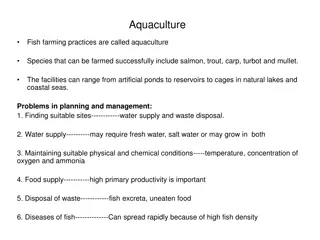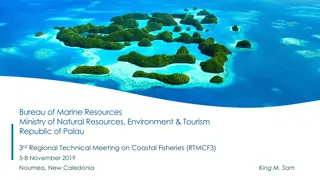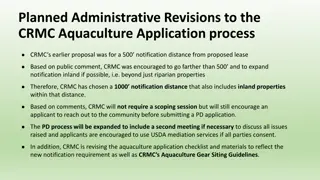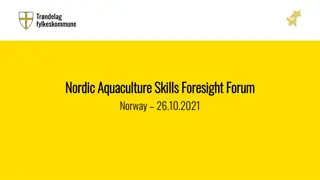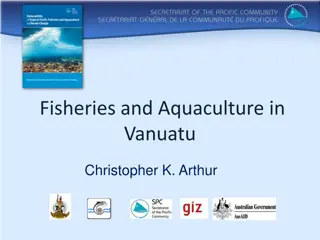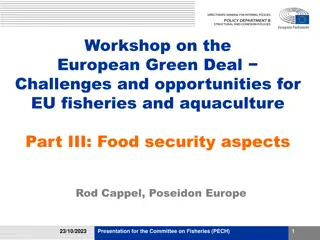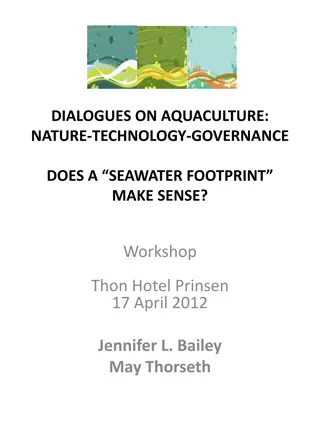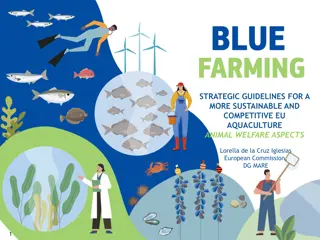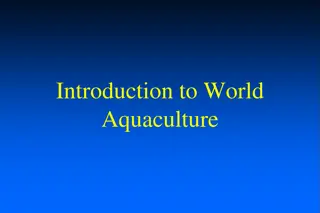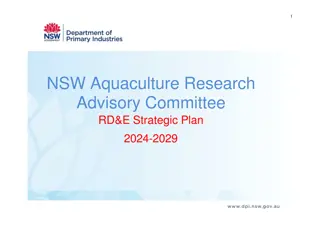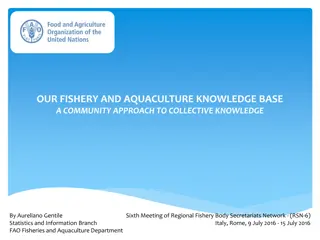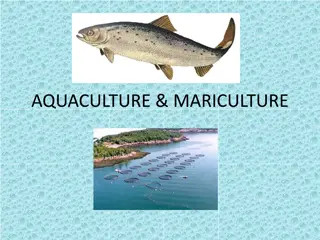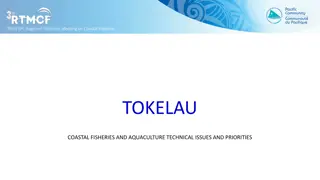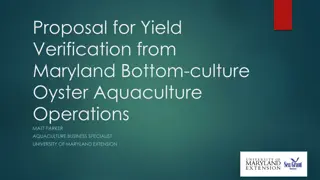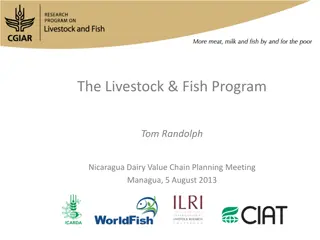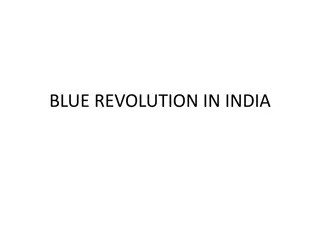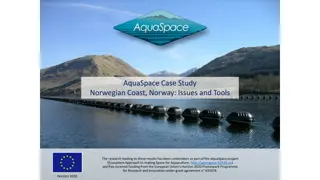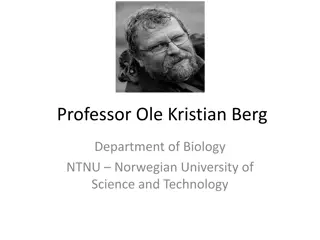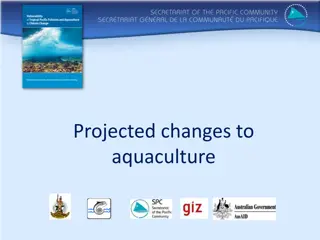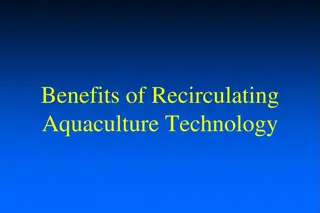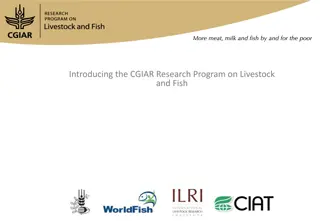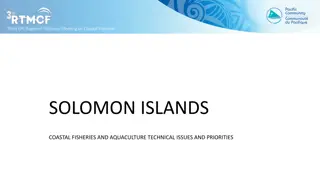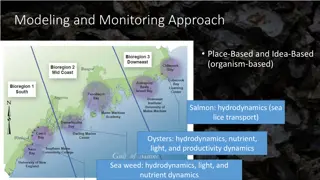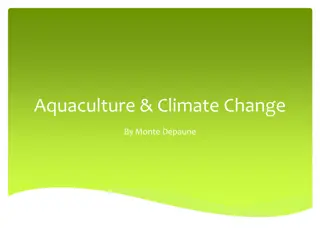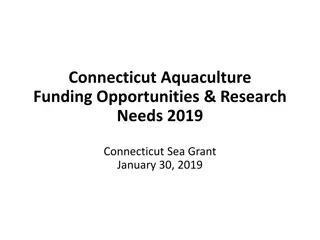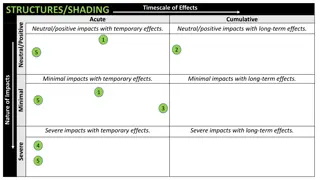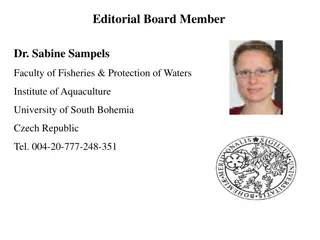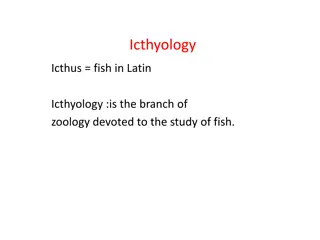CULTURE SYSTEMS IN AQUACULTURE
Aquaculture, the farming of aquatic organisms, involves various culture systems categorized based on habitat, expenses, site, variety, and integration with other organisms. Monoculture, a common practice, focuses on cultivating a single fish species in a controlled environment, offering advantages l
0 views • 49 slides
BMR Group of Industries - Leading the Way in Shrimp Farming Innovation
BMR Group of Industries is a vertically integrated company providing comprehensive solutions to shrimp farmers. Established in 1991, the group has been instrumental in introducing new shrimp species like Pacific Whiteleg shrimp and improving aquaculture practices in India. Dr. B. Masthan Rao, the vi
0 views • 16 slides
COMPUTER ORGANISATION Register Transfer Language
Register Transfer Language is a symbolic notation used to describe the micro-operations transferring data among registers in computer organisation. It signifies the availability of hardware logic circuits to perform specified micro-operations and transfer results between registers. Register Transfer
6 views • 7 slides
Overview of Reservoir Fisheries and Aquaculture in India
Reservoir fisheries play a vital role in India's aquaculture sector, with over 19,000 reservoirs covering millions of hectares. These manmade impoundments serve various purposes like irrigation and power generation. The reservoirs are classified into small, medium, and large categories based on thei
1 views • 28 slides
Sustainable Aquaculture Products Attract Environmentally Conscious Consumers
Aquaculture Market By Product Types(Equipment, Chemicals, Pharmaceuticals, Fertilizers), By Culture(Fresh Water, Brackish Water, Marine Water), By Species( Aquatic Plants, Aquatic Animals), By End-User(Seafood Industry, Pharmaceuticals, Others), By R
0 views • 4 slides
Enhancing Sustainable Fisheries Management and Aquaculture Development in Africa: FishGov-2 Project
The FishGov-2 project aims to enhance sustainable fisheries management and aquaculture development in Africa, aligning with AU Agenda 2063. It focuses on evidence-based policies, coordination at different levels, and effective participation in international forums. The project seeks to improve food
1 views • 26 slides
Composite Fish Farming: An Innovative Aquaculture Technique
Composite fish farming is a popular aquaculture technique where different compatible fish species are cultured together in ponds to maximize fish production. Researchers from India and abroad have contributed significantly to this field. The practice involves combining Indian major carps like Catla,
1 views • 19 slides
Understanding Cage Culture in Aquaculture
Cage culture involves cultivating fish in meshed boxes submerged in water bodies like rivers, lakes, estuaries, and seas. Originating about 200 years ago, it has evolved into an intensive aquaculture method. Components like cage frame, floats, sinkers, and nets play crucial roles in this farming tec
1 views • 16 slides
Understanding Sewage Microbiology, Water Treatment, and Quality Control in Natural Waters
Dr. Abhishek Thakur, an Assistant Professor specializing in sewage microbiology, self-purification in natural waters, sewage treatment, drinking water microbiology, and sanitary water quality for aquaculture, explains the processes involved in water treatment, sewage and wastewater treatment, primar
0 views • 18 slides
Understanding Computer Organization and Design: Chapter 2
This content discusses shift operations, AND operations, OR operations, EOR operations, and conditional operations in computer organization and design. It covers topics such as shifting logical operations, masking bits, including bits, differencing operations, and conditional branching instructions,
0 views • 22 slides
4th SPC Regional Technical Meeting on Coastal Fisheries and Aquaculture - Provisional Agenda
The 4th SPC Regional Technical Meeting on Coastal Fisheries and Aquaculture is set to take place on 12-15 October 2021 in a virtual format. The agenda includes sessions on integrating e-data systems into coastal fisheries, enhancing capacity for fisheries management, and community-based fisheries di
0 views • 9 slides
Understanding Aquaculture and Its Regulatory Impacts on Industry Growth
Aquaculture involves farming fish, molluscs, and plants in controlled environments, offering a sustainable way to grow economies and provide protein. However, regulatory efforts like NEMBA are affecting industry growth by imposing restrictions on both alien and indigenous species. These regulations
2 views • 16 slides
Challenges and Future Trends in Aquaculture Farming Practices
Aquaculture, or fish farming, involves farming species like salmon, trout, and carp in various facilities ranging from artificial ponds to coastal cages. Challenges in planning and management include finding suitable sites, maintaining water supply, ensuring proper physical and chemical conditions,
1 views • 4 slides
Coastal Fisheries and Aquaculture Development in Palau: Priorities and Progress
The Bureau of Marine Resources in Palau has identified key technical priorities for coastal fisheries and aquaculture development. These priorities include updating strategic plans, strengthening institutional frameworks, establishing data management programs, and enhancing aquaculture capabilities.
0 views • 6 slides
Revised Administrative Updates to CRMC Aquaculture Notification Process
CRMC has revised its aquaculture application process by increasing the notification distance to 1000 feet and including inland properties. Scoping sessions are no longer required, but applicants are encouraged to engage with the community. The PD process now includes a second meeting if necessary, w
0 views • 17 slides
Future Trends in Aquaculture Education and Training in Nordic Countries
The content discusses the current and future needs for aquaculture education in Nordic countries, focusing on short-term and long-term perspectives. Key points include the importance of practical education, specialized courses in technology and fish health, and collaboration between authorities and
0 views • 14 slides
Fisheries and Aquaculture in Vanuatu: Sustainable Development and Management
Vanuatu aims to ensure sustainable exploitation of fisheries resources, maximize economic and social benefits, contribute to food security, and meet regional responsibilities through its fisheries sector. The country's Exclusive Economic Zone (EEZ) covers 668,220 km2, with key features including a r
0 views • 17 slides
Workshop on European Green Deal Challenges & Opportunities for EU Fisheries and Aquaculture
The presentation by Rod Cappel from Poseidon Europe discusses the food security aspects of the European Green Deal (EGD) for EU fisheries and aquaculture. It covers study objectives, EGD policy instruments overview, case studies on EU seafood imports and aquaculture, and provides policy recommendati
0 views • 11 slides
Cross-disciplinary Dialogue on Aquaculture Sustainability
Explore the concept of Sea Water Footprint (SWFP) and its relevance to aquaculture sustainability through a workshop at Thon Hotel Prinsen. Delve into the integration of social science, humanities, natural science, and technology to address key issues in Marine Coastal Development. Discuss the poten
0 views • 5 slides
Enhancing Animal Welfare in EU Aquaculture: Strategic Guidelines for Sustainability
Strategic guidelines focus on EU aquaculture policy, aiming to improve animal welfare, meet societal demands, and align with the European Green Deal. Key objectives include growth, sustainability, and competitiveness, with a focus on resilience and knowledge enhancement. Specific horizontal objectiv
0 views • 10 slides
Understanding the Dynamics of World Aquaculture and Seafood Trade
Aquaculture plays a vital role in providing essential nutrition to over one billion people globally, with more than 50% of food fish supply originating from this system. Seafood holds significant importance in international trade, surpassing all other animal proteins combined. However, challenges su
0 views • 8 slides
NSW Aquaculture Research Advisory Committee RD&E Strategic Plan 2024-2029
The NSW Aquaculture Research Advisory Committee (ARAC) was established to advise the Minister on contributions for aquaculture research and development. The strategic plan outlines priorities, framework, and performance indicators for RD&E investments in the NSW aquaculture industry. It emphasizes c
0 views • 14 slides
Enhancing Fisheries and Aquaculture Knowledge for Sustainable Development
The Fishery and Aquaculture Knowledge Base, presented at the Sixth Meeting of Regional Fishery Body Secretariats Network, focuses on collective knowledge exchange in the fisheries and aquaculture sector. This knowledge hub offers a wealth of information on various aspects, supporting Sustainable Dev
0 views • 13 slides
Understanding Aquaculture and Mariculture Practices
Aquaculture encompasses the breeding, rearing, and harvesting of aquatic organisms in various water environments, while mariculture focuses on marine plants and animals in marine or brackish water. This includes controlled breeding for commercial, recreational, and conservation purposes. Technologic
0 views • 30 slides
Coastal Fisheries and Aquaculture Priorities in Tokelau
This document discusses the technical issues and priorities for coastal fisheries and aquaculture in Tokelau, a group of low-lying coral atolls heavily dependent on coastal resources. It highlights the need for assessing fisheries resources, supporting sustainability, and exploring aquaculture poten
0 views • 6 slides
Yield Verification Study for Maryland Bottom-culture Oyster Aquaculture
Maryland's bottom-culture oyster aquaculture has seen rapid growth, but growers struggle to accurately predict yields. This proposal outlines a study to determine survival rates, optimal spat planting density, and growth rates for market-sized oysters. Collaboration with experts and producers will p
0 views • 11 slides
Accelerating Livestock and Aquaculture Development for Sustainable Impact
Research-based approach to accelerate livestock and aquaculture development for the benefit of the poor by addressing the productivity gap, focusing on small-scale production, and leveraging partnerships with development actors to transform value chains and achieve sustainable impact.
0 views • 20 slides
The Blue Revolution: Transforming India's Fisheries Sector
The Blue Revolution in India refers to the significant increase in fish and marine product production through innovative techniques and government-sponsored programs. Launched during the 7th Five-Year Plan, it has revolutionized aquaculture practices, leading to improved breeding, rearing, marketing
0 views • 15 slides
Sustainable Aquaculture Zoning Strategies in Norwegian Coast: A Case Study
The AquaSpace project in Norway addresses zoning for sustainable aquaculture growth, focusing on regulating spatial planning for the salmon industry. Utilizing tools like the traffic light system and stakeholder feedback, the case study emphasizes the importance of managing salmon lice impact on wil
0 views • 6 slides
Research Contributions of Professor Ole Kristian Berg in Fish Ecology and Aquaculture
Professor Ole Kristian Berg from the Department of Biology at NTNU has made significant contributions to the fields of fish ecology and aquaculture. His research focuses on topics such as biotic interactions, competitive asymmetries, conservation biology, lipid stores in fish, and the effects of hyd
0 views • 5 slides
Aquaculture Adapting to Climate Change: Insights and Strategies
Aquaculture faces evolving challenges due to climate change. Freshwater and coastal aquaculture, focusing on tilapia, milkfish, freshwater prawn, and marine species, are explored. The vulnerability of aquaculture is highlighted, along with potential benefits and risks posed by climate change. Strate
0 views • 25 slides
Advantages of Recirculating Aquaculture Systems for Sustainable Fish Production
Recirculating aquaculture technology offers numerous benefits such as water reuse, minimized water consumption, enhanced biosecurity, and cost-effectiveness. By adopting recirculating systems, aquaculture farms can comply with stricter regulations, address water scarcity issues, and optimize product
0 views • 13 slides
Accelerating Livestock and Aquaculture Development for Poverty Reduction
The CGIAR Research Program on Livestock and Fish aims to address the challenges and misconceptions surrounding livestock and aquaculture development. It focuses on increasing productivity in small-scale systems to benefit the poor and improve food security. The program seeks to correct misconception
0 views • 27 slides
Coastal Fisheries and Aquaculture Priorities in Solomon Islands
The Third SPC Regional Technical Meeting highlighted key technical priorities for coastal fisheries and aquaculture in the Solomon Islands, focusing on community-based resource management, science-based stock assessment, aquaculture biosecurity, and conducive environment for development. Recent acti
0 views • 6 slides
Aquaculture Modeling and Monitoring Approach in Coastal Ecosystems
This comprehensive modeling and monitoring approach focuses on understanding hydrodynamics, nutrient dynamics, and productivity in various organisms like salmon, oysters, and sea weed. Through data compilation, stakeholder involvement, and site selection informed by aquaculture, the project aims to
0 views • 15 slides
Aquaculture and Climate Change: Strategies for Sustainable Milkfish Farming in Nauru
Nauru is looking to revitalize its aquaculture sector by focusing on milkfish farming to enhance food security and economic sustainability. The government is taking steps to develop aquaculture infrastructure and expand production to meet growing demand. With projected changes due to climate change,
0 views • 15 slides
Connecticut Aquaculture Funding Opportunities & Research Needs 2019
Explore current funding opportunities for aquaculture projects in Connecticut through programs like the CT Sea Grant Omnibus Funding. Emphasis is on addressing industry needs, conducting applied research, and developing knowledge in areas related to fisheries, aquaculture, and marine resources. Nati
0 views • 17 slides
Marine Aquaculture Impacts on Submersed Aquatic Vegetation
The document explores the impacts of structures and shading used in commercial shellfish mariculture activities on submersed aquatic vegetation, particularly seagrasses. It discusses the varying effects of mariculture structures on eelgrass density, productivity, and the potential habitat they provi
0 views • 11 slides
Dr. Sabine Sampels: Research on Aquaculture, Fish Quality, and Human Health
Dr. Sabine Sampels, a member of the Editorial Board at the University of South Bohemia, Czech Republic, specializes in studying the effects of fish consumption on human health, animal nutrition on fish quality, and lipid metabolism. With a background in Food Chemistry and extensive research experien
0 views • 25 slides
Understanding Ichthyology: The Study of Fish and Aquaculture
Ichthyology, the branch of zoology dedicated to the study of fish, plays a crucial role in meeting the growing global demand for animal protein. With aquaculture emerging as a vital source of protein, fish not only provide essential nutrients but also contribute to health and nutrition. The classifi
0 views • 18 slides

